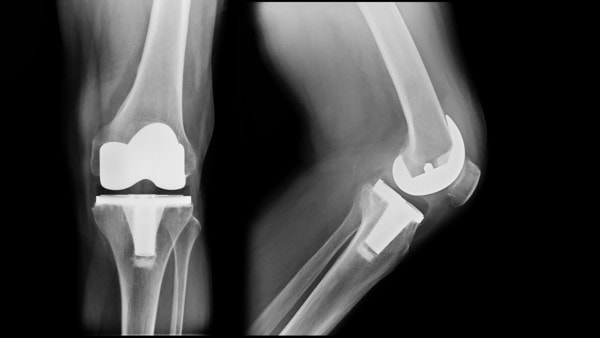Who is more likely to have a Complication from a Knee Replacement?

Total knee replacement on both knees. Tridsanu Thopet/Shutterstock
New study out today that looked at which patients who were more likely to get complications with knee replacement. A little more than 1 in 10 patients who have a knee replacement suffer a serious complication. The study, not surprisingly, found that age was a major predictor of complications with these invasive knee surgeries. In fact, with every decade of increased age, the knee replacement patients in this study were 40% more likely to have a complication. This makes sense, as the average age for these surgeries is between 60-70, so adding ten years onto those numbers would equal 70-80 and then 80-90. Other studies have also shown that once the patient gets over 80 years of age, the risk factors for knee replacement go way up. Of note, patients who underwent a bilateral knee replacement procedure were 65% more likely to get a complication. This is concerning, as having both knees replaced is becoming increasingly common, as many patients want to “get it all over with in one surgery”. However, two surgeries are bound to be more risky than one. A surprise was that patients that opted for the less invasive epidural anesthesia (numbing the legs through the spine), were 260% more likely to have a complication. Not surprising was that patients with known heart disease were more likely to have a transfusion, more likely to have major knee related complications, including joint infection and/or a major whole body complication, and more likely to require another operation after the initial knee replacement surgery. While many of these risk factors are currently used to counsel patients on whether they should get a knee replacement or not, I think some of these risk factors are less understood by patients. For example, despite many surgeons warning patients about bilateral knee replacement procedures, this practice is becoming more and more common. In addition, moving away from epidural anesthesia for these procedures is a new recommendation. Finally, any patient with a known heart condition should seriously consider whether a very big surgery like knee replacement is a good idea and work with his/her cardiologist on clearance before deciding whether to have a knee replacement surgery.

If you have questions or comments about this blog post, please email us at [email protected]
NOTE: This blog post provides general information to help the reader better understand regenerative medicine, musculoskeletal health, and related subjects. All content provided in this blog, website, or any linked materials, including text, graphics, images, patient profiles, outcomes, and information, are not intended and should not be considered or used as a substitute for medical advice, diagnosis, or treatment. Please always consult with a professional and certified healthcare provider to discuss if a treatment is right for you.
